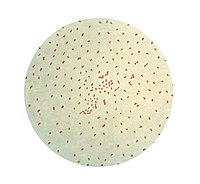
Photo from wikipedia
Despite high vaccine coverage in developed countries, the incidence of pertussis has increased in recent decades, often leading to severe consequences for sensitive groups, including infants. For this reason, improving… Click to show full abstract
Despite high vaccine coverage in developed countries, the incidence of pertussis has increased in recent decades, often leading to severe consequences for sensitive groups, including infants. For this reason, improving the efficacy of pertussis vaccines is critical, and the addition of new antigens is a leading strategy to achieve this goal. ABSTRACT Bordetella produces an array of virulence factors, including the adenylate cyclase toxin (ACT), which is essential, immunogenic in humans, and highly conserved. Despite mediating immune-evasive functions as a leukotoxin, ACT’s potential role as a protective antigen is unclear. To better understand the contributions of humoral anti-ACT immunity, we evaluated protection against Bordetella pertussis by antibodies binding structurally defined ACT epitopes in a mouse pneumonia model. An ACT-neutralizing antibody, but not a nonneutralizing antibody or an isotype control, significantly increased mouse survival after lethal challenge with B. pertussis. When modified to impair Fc effector functions, the neutralizing antibody retained protective capabilities, indicating that protection was mediated by the blockade of the interactions of ACT with its αMβ2 integrin receptor. After infection with a lower bacterial dose, ACT neutralization synergistically reduced lung bacterial colonization levels when combined with an opsonic antibody binding the surface antigen pertactin. Notably, protection was significantly enhanced when antibodies were administered intranasally as opposed to systemically, indicating that local immune responses are key to antibody-mediated protection against ACT and pertactin. These data reconcile previous conflicting reports to indicate that neutralizing anti-ACT antibodies support the phagocytosis of opsonized B. pertussis and thereby contribute to pertussis protection in vivo. IMPORTANCE Despite high vaccine coverage in developed countries, the incidence of pertussis has increased in recent decades, often leading to severe consequences for sensitive groups, including infants. For this reason, improving the efficacy of pertussis vaccines is critical, and the addition of new antigens is a leading strategy to achieve this goal. The Bordetella pertussis adenylate cyclase toxin (ACT) acts to disarm host immunity and is considered a promising vaccine candidate since it is found in all Bordetella species. In this work, we show that antibodies neutralizing ACT offer protection against pertussis. Using a murine infection model, we show that antibodies neutralizing ACT can contribute to protection against infection through synergistic interactions with antibodies recognizing current vaccine antigens. Our data can help guide the design of future vaccines, whereby the inclusion of ACT-based immunogens might increase protection against pertussis infection.
Journal Title: mBio
Year Published: 2022
Link to full text (if available)
Share on Social Media: Sign Up to like & get
recommendations!